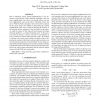Free Online Productivity Tools
i2Speak
i2Symbol
i2OCR
iTex2Img
iWeb2Print
iWeb2Shot
i2Type
iPdf2Split
iPdf2Merge
i2Bopomofo
i2Arabic
i2Style
i2Image
i2PDF
iLatex2Rtf
Sci2ools
113
Voted
ICIP
2010
IEEE
2010
IEEE
A game theoretical approach for image denoising
How to adaptively choose optimal neighborhoods is very important to pixel-domain image denoising algorithms since too many neighborhoods may cause over-smooth artifacts and too few neighborhoods may not be able to efficiently remove the noise. While the Stein's principle is shown to be able to estimate the true mean square error (MSE) for determining the optimal neighborhoods, there exists a trade-off between the accuracy of the estimate and the minimum of the true MSE. In this paper, we study the impact of this trade-off and formulate the image denoising problem as a coalition formation game. In the game, every pixel is treated as a player, who tries to seek partners to form a coalition to achieve better denoising results. By forming a coalition, every player in the coalition can obtain a gain of improving the accuracy of the Stein's estimate while incurring a cost of increasing the minimum of the true MSE. We also propose a heuristically distributed approach for coalition ...
Related Content
| Added | 12 Feb 2011 |
| Updated | 12 Feb 2011 |
| Type | Journal |
| Year | 2010 |
| Where | ICIP |
| Authors | Yan Chen, K. J. Ray Liu |
Comments (0)

